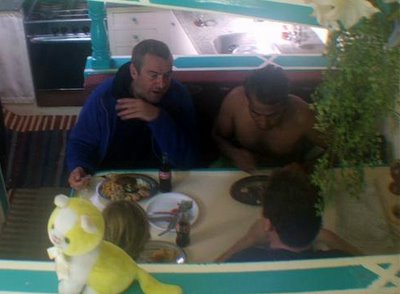With unusual aplomb for Americans, M, her bro T and I cruised down the Red Sea highway to Hurghada. It’s a bustling tourist location at the westside base of the west finger of the Red Sea. It’s a tourist location for a reason: the desert blows its warm breath over hotels and villas that front a calm sea with some of the best scuba diving in the world.
This isn’t a typical American destination; even less so than Cairo and Giza’s pyramids. Generally unfounded worries of Islamic terrorists keep Americans out and Egyptian tourist security tight.
But that doesn’t stop the Euro-tourists from flocking to the sun, sand and sea. All shapes, all sizes, bussed in, flown in. Czechs, Germans, Austrians, Poles, Russians. And the Egyptians are glad to welcome them all, despite the westerners' shocking taste in clothes and bottomless thirst for Islam-forbidden booze. Many of the Egyptian workers at Hurghada come from the economically-troubled region in Southern Egypt. South Egypt is something like the Indian reservations in South Dakota: the last place in the world you’d go to find good doctors or good jobs. And people from the area often mocked and derided for where they come from, just like “the Rez” jokes you hear back home.
So it’s worth putting up with the trashy tourists that infest the hotels and bars. To Egypt, they’re solid-gold bank.
But that doesn’t mean they have to like it.
“I don’t go out with Russians anymore,” says the divemaster on one of the boats we scuba-ed from on the first day. He’s originally from Germany, close to Hamburg. But that life is his no longer. “I have nothing there,” he says, “only friends. And they come to visit me here.” He smiles.
 During lunch, the German expat divemaster explains the ways of Russians to Me and M
During lunch, the German expat divemaster explains the ways of Russians to Me and MHe hates Russians, and not just because they commit the typical tourist sins. He tells of a trip to the reefs with some Russians who packed vodka in water bottles—the easier to smuggle the booze on the boat. For them, the break between dives—usually a lunch and rest break—was a chance to get happily sloshed.
It rubbed the expat German divemaster the wrong way, mostly because alcohol and scuba diving simply do not mix. Your life is on the line every time you trust yourself to a couple of hoses sprouting from a bottle of air. He didn’t like Russians personally either – “no culture,” he says, but the vodka was the last straw.
He choice could also affect his pocketbook – he estimated half of tourists in Hurghada hailed from the Great White North. Americans were a species he hadn’t seen in over a year.
 Me and M on the stern of the dive boat - leaving Hurghada's port
Me and M on the stern of the dive boat - leaving Hurghada's port Saying hi to Nemo - All the clownfish were curious about the strange bubbling ones invading their home
Saying hi to Nemo - All the clownfish were curious about the strange bubbling ones invading their homeNeither had the owner of a restaurant we went to the second night. To celebrate, he brought us a free appetizer on the house. I wondered if maybe the Americans he remembered were the same ones the divemaster recalled as well. I made a note to be on my best behavior. For once, I felt like I could make a fundamental difference in the relations between Egypt and the US.
So I smiled a lot, and avoided the vodka.
 OK. Sounds fair enough. But I have to ask - do other militaries fall into the Rodney King "Can't we all just get along?" school of tactics and strategy? Now don't get all Sun Tzu on me - I know there are many ways to defeat an enemy, and you're most successful when you beat them without even meeting them on a field of battle.
OK. Sounds fair enough. But I have to ask - do other militaries fall into the Rodney King "Can't we all just get along?" school of tactics and strategy? Now don't get all Sun Tzu on me - I know there are many ways to defeat an enemy, and you're most successful when you beat them without even meeting them on a field of battle.






